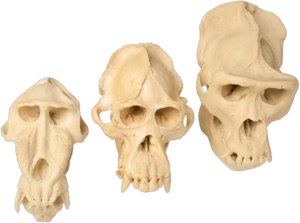Schizophrenia and Evolution

Schizophrenia remains one of the cruelest illnesses ever to afflict humanity. There are more theories about it than any other problem, and we may be getting closer to understanding why it seems to occur only in humans, and at roughly the same rate throughout the world. One idea is that the genetic predisposition to schizophrenia might have evolved as a secondary consequence of selection for human cognitive traits. As humans have evolved so has the brain, and it has become more lateralized, so this might explain the association between schizophrenia and handedness.
Several genes with strong associations to schizophrenia have evolved rapidly during human evolution, according to new research in the Proceedings of the Royal Society B this week.
In support of the cognition/schizophrenia hypothesis, researchers Dr Steve Dorus from the University of Bath, who worked with Dr Bernard Crespi from Simon Fraser University in Canada and Dr Kyle Summers from East Carolina University in the United States found that these genes had been positively selected.
They analyzed the molecular evolution of the 76 genes that have the strongest genetic association with the disorder. They surveyed human polymorphisms for discrete changes in the human genome that vary between individuals, in order to try and track very recent selective events within specific human populations. They also compared genes between mammalian species to identify selection on primate lineages salient to the evolution of humans and the disorder.
Amongst the genes for which they found positive selection were three genes that have the best functional or reproducible associations with the disorder: disrupted in schizophrenia (DISC1), dystrobrevin-binding protein 1 (DTNBP1) and neuregulin 1 (NRG1).
The selective forces underlying adaptive evolution of these genes remain largely unknown, but these findings are consistent with the hypothesis that schizophrenia is a maladaptive by-product of adaptive changes during human evolution, perhaps associated with creativity and human cognition.






